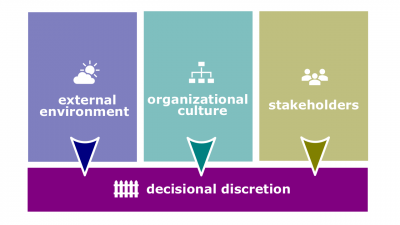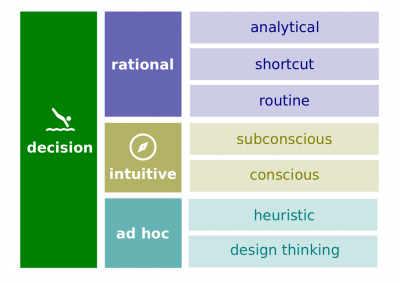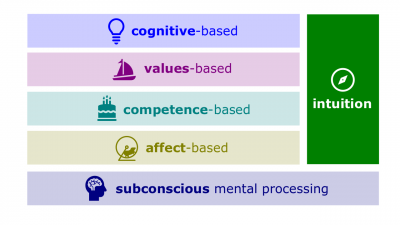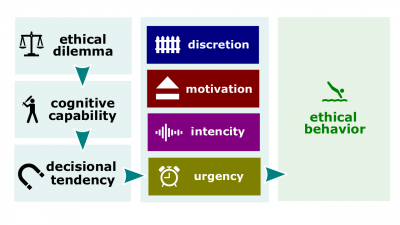Decision-making
Decision-making (alternatively spelled, decision making) is the action, process, and/or creative behavior of making decisions.
Classifications
Any decision is a choice made from among two or more alternatives. The criteria that define what's important or relevant to resolving a problem are known as decision criteria. The freedom to decide what should be done in a particular situation is known as decisional discretion.
Programmed vs non-programmed
- Programmed decision. Any decision to follow a policy, operative rule, another regulation, or to routinely repeat one's previous decision that has been made while handling a similarly structured task.
- Non-programmed decision (creative decision). A unique and nonrecurring decision that requires a custom-made solution.
Individual vs collective
- Individual decision-making. Decision-making made by an individual as opposed to group decision-making.
- Group decision-making.
Consequential vs sounding
Factors
Forced vs leisure
Controlled vs uncontrolled
- Controlled expectancy. A situation in which a decision maker is able to estimate the likelihood of certain outcomes.
- Certainty. A situation in which a decision maker can make accurate decisions because all outcomes are known.
- Uncertainty. A situation in which a decision maker has neither certainty nor reasonable probability estimates available.
Internal vs external
- Core self-evaluation. Bottom-line conclusions individuals have about their capacities, competence, and worth as a person. In other words, self-believing in one's inner worth and basic competence.
- General mental ability. An overall factor of intelligence, as suggested by the positive correlations among specific intellectual ability dimensions.
Approaches
Decision-making approach. A particular manner of taking preliminary steps toward making a decision.
Rational
- Rational decision-making. Decision-making that produces choices that are logical and consistent and maximize value.
- Rationale. A reasoning characterized by making consistent, value-maximizing choices within specified constraints.
Intuitive
- Intuitive decision-making. Unconscious decision-making on the basis of distilled experience, feelings, and accumulated judgment.
- Intuition. An instinctive feeling not necessarily supported by research.
Ad hoc
- Ad hoc decision-making.
- Design thinking. Approaching management problems as designers approach design problems.
- Heuristic. A rule of thumb that decision makers use to simplify decision-making.
Tendencies
Optimizing vs. satisficing
- Satisfice. Acceptance of solutions that are "good enough."
Conservative vs aggressive
- Allostasis. Working to change behavior and attitude to find stability.
Process types
Agile vs rigid
Linear vs nonlinear
Considerations
Self-regulation
- Self-regulation strategy.
- Prevention focus. A self-regulation strategy that involves striving for goals by fulfilling duties and obligations.
- Promotion focus. A self-regulation strategy that involves striving for goals through advancement and accomplishment.
Ethics
- Ethical dilemma. A situation in which individuals are required to define right and wrong conduct.
- Ethics. Principles, values, and beliefs that define what is right and wrong behavior.
- Behavioral ethics. Analyzing how people actually behave when confronted with ethical dilemmas.



